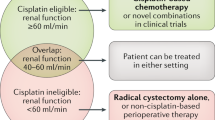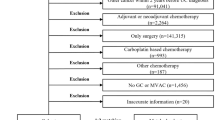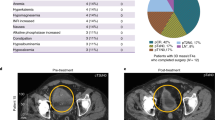Abstract
The aim of the present retrospective study was to assess long-term survival after cisplatin-based chemotherapy in 398 patients with advanced urothelial transitional cell carcinoma (TCC) treated at seven international oncological units. Various combinations of cisplatin, methotrexate, vinblastine (or vincristine) and doxorubicin were used. The complete response rate according to the WHO criteria was 17%. Partial responses were obtained in 42% of the patients. The overall cancer-related 2 year and 5 year survival rates were 21% and 11% respectively. Based on multivariate analyses, a good prognosis group could be identified comprising patients with a good performance status with disease confined to lymph nodes (14%) or patients with T4b disease only. These patients had a 28% 5 year survival rate, which, in part, has to be related to post-chemotherapy consolidation treatment in patients with pelvis-confined disease (radiotherapy, 26%; total cystectomy, 11%). Fifteen patients died of chemotherapy-related complications and in 16% of the patients toxicity led to discontinuation of treatment. Modern cisplatin-based chemotherapy leads to long-term survival and cure of selected patients with advanced urothelial transitional cancer. In routine clinical practice, chemotherapy should be offered to good prognosis patients; those presenting with a good performance status and a non-metastasising T4b tumour or with metastases confined to lymph nodes. Post-chemotherapy consolidation treatment by surgery or radiotherapy should always be considered. Such chemotherapy requires oncological expertise in order to avoid unnecessary toxicity.
This is a preview of subscription content, access via your institution
Access options
Subscribe to this journal
Receive 24 print issues and online access
$259.00 per year
only $10.79 per issue
Buy this article
- Purchase on Springer Link
- Instant access to full article PDF
Prices may be subject to local taxes which are calculated during checkout
Similar content being viewed by others
Author information
Authors and Affiliations
Rights and permissions
About this article
Cite this article
Fosså, S., Sternberg, C., Scher, H. et al. Survival of patients with advanced urothelial cancer treated with cisplatin-based chemotherapy. Br J Cancer 74, 1655–1659 (1996). https://doi.org/10.1038/bjc.1996.605
Issue Date:
DOI: https://doi.org/10.1038/bjc.1996.605
This article is cited by
-
Clinical response to induction chemotherapy predicts improved survival outcome in urothelial carcinoma with clinical lymph nodal metastasis treated by consolidative surgery
International Journal of Clinical Oncology (2015)
-
Phase II multicentre study of docetaxel plus cisplatin in patients with advanced urothelial cancer
British Journal of Cancer (2002)



